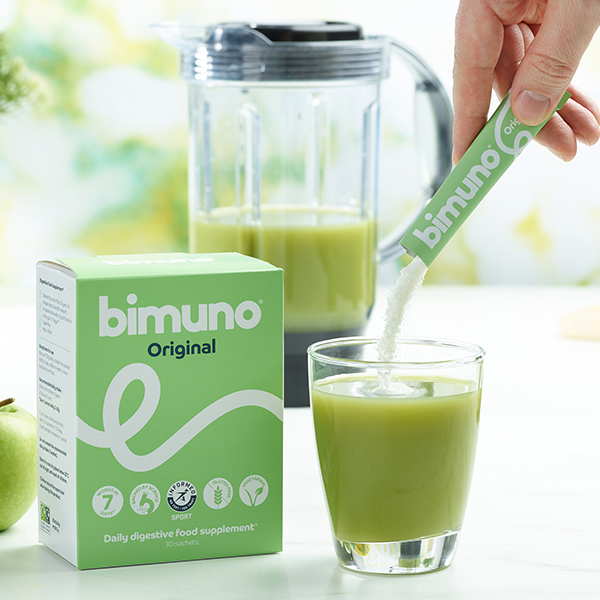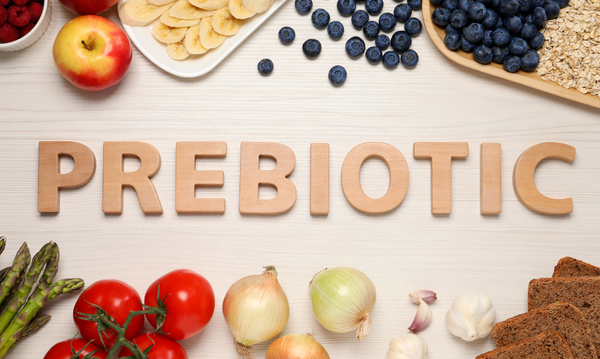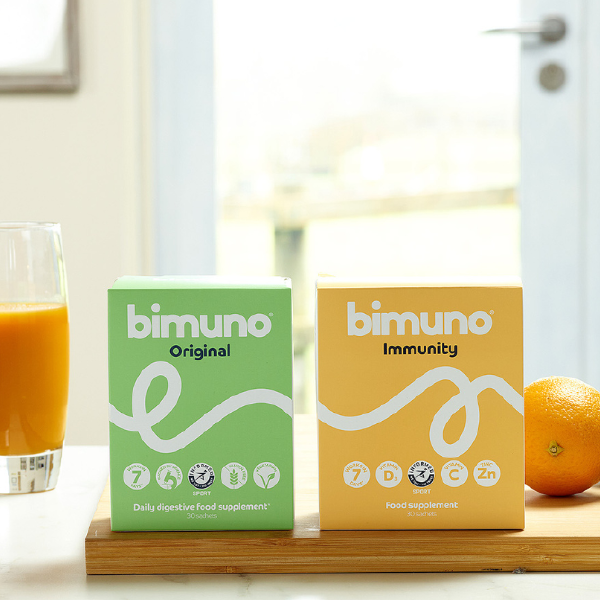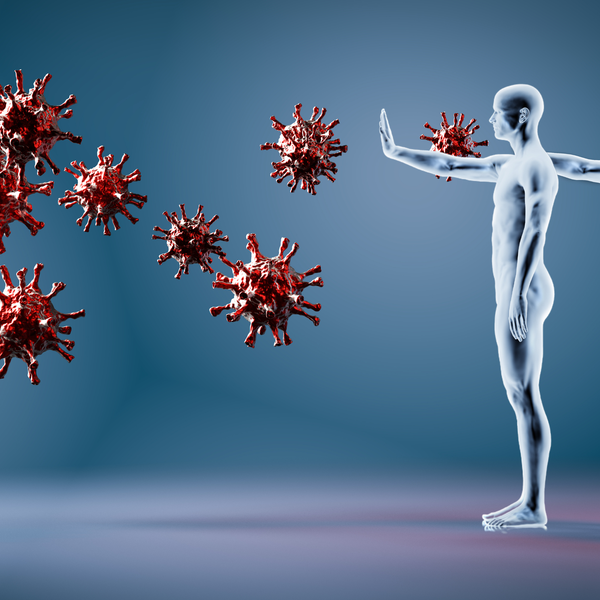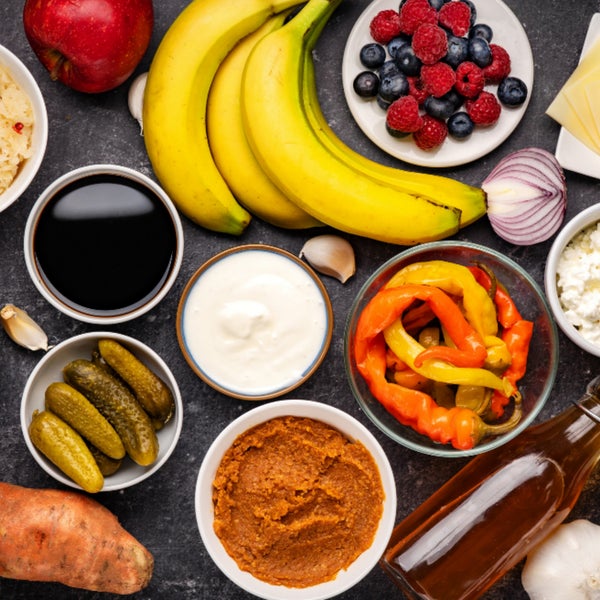Understanding Prebiotics and Probiotics
Although the words prebiotic and probiotic may sound similar and are sometimes confused, they are fundamentally quite different. On a basic level, prebiotics are the substrate and therefore provide food for the endogenous beneficial bacteria in the gut microbiome. On the other hand, probiotics are the live strains of beneficial bacteria which may or may not be present in the gut microbiome.
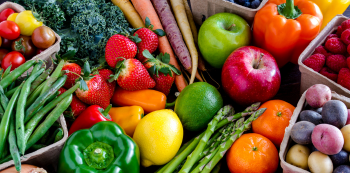
Key differences between Prebiotics and Probiotics
Both prebiotics and probiotics can be found naturally in foods such as fruit, vegetables, legumes, pulses and fermented foods. Ideally, we should obtain the recommended daily intake of 5g of prebiotic fibre through diet, but research shows that in the UK we do not consume enough of these foods.
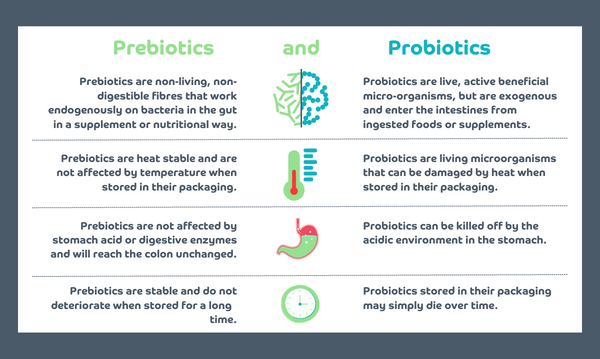
Supplementing the diet
Prebiotic and probiotic supplements have both been developed to help restore the balance of bacteria in the gut microbiome.
What are Prebiotics?
The International Scientific Association for Probiotics and Prebiotics (ISAPP) defines a prebiotic as a substrate that is selectively utilised by host microorganisms conferring a health benefit.
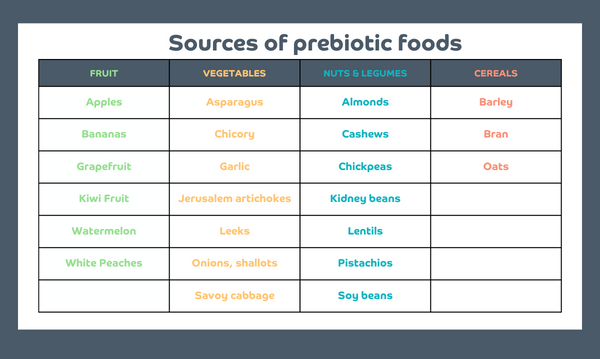
Which foods contain prebiotics?
The major source of prebiotics is dietary fibre and they are found naturally in many foods including fruits, vegetables, cereal grains, legumes, and more specifically chicory, onions, leeks, asparagus, Jerusalem artichokes, bananas. While all prebiotics are dietary fibres, not all of the dietary fibres have prebiotic properties with the same benefits.
However, due to modern-day diets containing synthetic and highly processed ingredients as well as low fibre diets, our daily consumption of prebiotics may be too low to meet the recommended dietary requirements to maintain good gut health and in order to do so we should consume large amounts of the above foods daily.
The International Scientific Association for Probiotics and Prebiotics (ISAPP) recommends a daily prebiotic dietary fibre intake of at least 5g.
Prebiotic supplements
To increase daily prebiotic intake, one can include high fibre prebiotic supplements* or foods that have prebiotics added during their manufacturing. Caution should be taken when recommending a prebiotic supplement as a higher intake may also cause GI discomfort so more is not necessarily better. Inulin based supplements require a higher intake (10-15g) to get a prebiotic effect. Bimuno® contains galactooligosaccharides (GOS) and studies show that a lower intake (2.9g) stimulates a prebiotic effect. A higher intake can be associated with GI effects and this may be why inulin based prebiotics are not recommended for those with IBS type symptoms.
*High fibre food supplements are intended to supplement the diet and should not be regarded as a substitute for a varied diet and a healthy lifestyle.
What are Probiotics?
Probiotics can be defined as:
“live microorganisms that, when administered in adequate amounts, confer a health benefit on the host.”[3]
Probiotics usually contain specific strains of bacteria that directly add to the populations of healthy microbes in the gut. There are a very large number of species of bacteria that are classified as probiotics. However, they all have varying benefits; as we all have different diets our gut microbiome composition will be unique to each of us, much like a fingerprint, and as a result, probiotics may not work for everyone. The bottom line is that all probiotics are different and they will therefore not all have the same effects.
Which foods contain probiotics?
Probiotics can be found in some yoghurts and cheeses and in fermented foods such as kefir and kombucha.
They may be recommended to help with digestive problems related to functional gut disorders, infection and antibiotics. However, researchers are still trying to determine those that are best for specific health problems.
What are the differences between prebiotics & probiotics?
There is a huge body of research using prebiotics and probiotics showing an association between the gut microbiome and overall health and wellbeing. However, prebiotics and probiotics are quite different in both structure and function.
The main difference is that the prebiotics reach the large intestine intact whereas probiotics are living organisms that can be killed by temperature and acidity. The number of probiotic bacteria that survive the journey to your colon and whether these numbers are sufficient to exert an effect is often a source of debate.
There are hundreds of different probiotic strains, which may make it more difficult to determine those that may be the most beneficial to specific individuals. There are also several different types of prebiotics and they do not all function in the same way. However, all of them may have an impact on feeding the beneficial bacteria that are already present in the gut, some more than others. Certain classes of prebiotic supplements such as galactooligosaccharides (GOS) have been found to be more selective and have a better effect on stimulating the growth and thereby promoting the growth of good bacteria at lower intakes, especially bifidobacteria.
In summary, although there are differences between the prebiotic and probiotic supplements, both may have some benefit in improving gut health and overall wellbeing. It is important that whichever supplement is chosen based on needs, that the product is taken regularly as recommended, in order to maintain a healthy balance in the gut microbiome that will have the optimal impact on promoting health.
Labelling restrictions on pre-packaged foods and supplements prebiotics and probiotics
The terms prebiotics and probiotics are deemed to be health claims and are not allowed under EU and UK law to be used on product packaging. To identify prebiotic products the nutritional table would state specific type of prebiotic such as inulin, FOS (fructooligosaccharides) or GOS (galactooligosaccharides).
On probiotic products, the bacterial species will usually be listed, for example, Bifidobacteria infantis or Lactobacillus rhamnosus.

